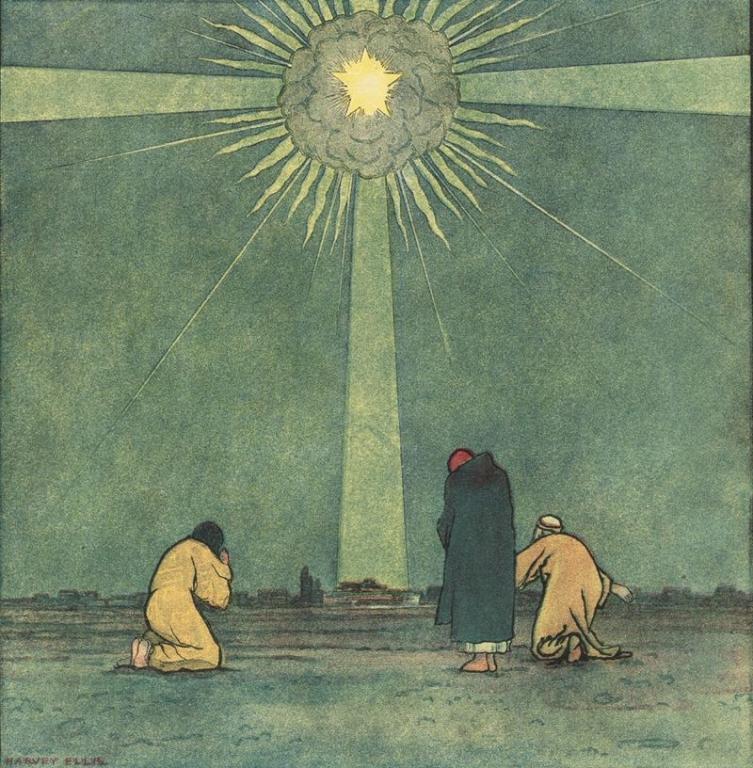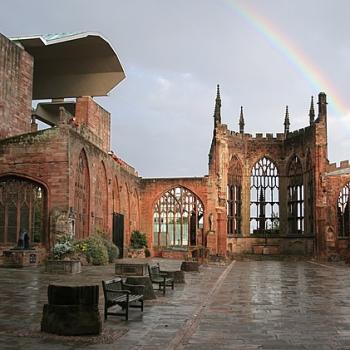
(Wikimedia Commons public domain image)
I published the column below in the Deseret News on 9 December 2010. I’m sharing it today partly because I’m sick and, for that reason, I have roughly the energy, at the moment, of an unusually lethargic clam. Despite its age, though, I don’t think that the article is, as yet, completely obsolete. And I hope that perhaps you might find something enjoyable or helpful in it for the season:
I often wonder which of the two holidays, Christmas or Easter, is the most theologically significant. Occasionally, I’m repelled not only by the commercialism of modern Christmas but by its sentimentality. It’s too easy, sometimes, to gush about the “babe of Bethlehem.”
Babies are cute. They’re funny. They’re unthreatening. And, although they certainly make demands upon their parents (often in the middle of the night), they don’t require our total obedience. Anyway, billions of babies have been born. Scores of millions are born every year. Roughly four are born every second, worldwide. The birth of a baby may well be a miracle, in a sense, but it’s an extremely common one. Nonbelievers and non-Christians can, and often do, enthusiastically celebrate Christmas.
Easter remains the more religiously serious holiday. Perhaps that’s why, Easter eggs and Easter chocolate and Easter dresses notwithstanding, it’s been more difficult to commercialize. And it’s harder for nonbelievers to join in the festivities. To celebrate the birth of a baby is one thing; to celebrate the resurrection of an executed man is quite another. If it weren’t for Easter, if it weren’t for belief in the Atonement and Resurrection of Christ, there would be no particular reason to celebrate Christmas.
But the central claim of Christmas isn’t merely that a baby was born. It’s that this particular newborn was, in fact, the perfect Son of God, the creator of the universe, our Lord and Savior. From this perspective, Christmas is the more fundamental holiday: no Christmas, no Easter.
I probably can’t resolve the question. And there is, perhaps, no need to resolve it. Both holidays commemorate essential parts of the divine plan for our salvation. But this much is indisputably true: that God took upon himself our weaknesses, our flesh — and, ultimately, our sins — is the central proposition that separates almost all forms of Christianity from all other religions. They’re close cousins to the Christian faith, but neither Judaism nor Islam represents God as coming down to earth, “suffering pains and afflictions and temptations of every kind … that he may know according to the flesh how to succor his people according to their infirmities” (Alma 7:11-12). Neither teaches of a God who “descended below all things, in that he comprehended all things, that he might be in all and through all things, the light of truth” (Doctrine and Covenants 88:6).
Even within Christianity, many thinkers have been powerfully tempted to replace the vulnerable, caring, even suffering deity of scripture with the “unmoved mover” of Aristotle, a God who lacks body, parts, and “passions” (or emotions). Ordinary Bible-reading Christians have always known better than some theologians, though. They don’t pray to an immovable stone. John 11:35 (“Jesus wept”) is not only the shortest verse in the Bible, but one of the most important; an “unmoved” God, “impassible,” lacking emotions, is not the God of scripture. “For God so loved the world,” says John 3:16, “that he gave his only begotten Son, that whosoever believeth in him should not perish, but have everlasting life.”
Still, the most important question remains: The story is beautiful, but is it true? Three stanzas from John Betjeman, the late British poet laureate, pose that question eloquently:
And is it true,
This most tremendous tale of all,
Seen in a stained-glass window’s hue,
A Baby in an ox’s stall?
The Maker of the stars and sea
Become a Child on earth for me?
And is it true? For if it is,
No loving fingers tying strings
Around those tissued fripperies,
The sweet and silly Christmas things,
Bath salts and inexpensive scent
And hideous tie so kindly meant,
No love that in a family dwells,
No carolling in frosty air,

Here is some very interesting and edifying background for two of the most appropriate films that I can think of for the Christmas season: “Jimmy Stewart was worried about losing the true spirit of Christmas too: ‘Everything is Santa Claus and presents’ instead of ‘what Christmas really means,’ said the famous actor to explain why he accepted a role in ‘Mr. Krueger’s Christmas’”

Leo D. Brown has kindly shared the following with me, and given me permission to share it with you:
Christmas in Bethlehem 2023
This year there will be only muted celebrations of Christmas in Bethlehem. Previously installed Christmas decorations have been removed in sympathy with innocent victims, especially children, living and dying in the horror and chaos of war. Streets, normally lit with festive lights, will be dark. There will be only local worship services, touched with sadness from these still unfolding events, and no throngs of pilgrims from around the world.
Gaspar, Balthazar, Melchior!
Where are your offerings now?
What greetings to the Prince of War,
His darkly branded brow?
The ancient altars smoke afresh,
The ancient idols stir;
Faint in the reek of burning flesh
Sink frankincense and myrrh. [1]
Yet Christmas is still joyously and beautifully celebrated around the world.
Dickens’ Ghost of Christmas Present showed Scrooge a scene in a humble hut at Christmas:
“…a cheerful company assembled round a glowing fire. An old, old man and woman, with their children and their children’s children, and another generation beyond that, all decked out gaily in their holiday attire. The old man, in a voice that seldom rose above the howling of the wind upon the barren waste, was singing them a Christmas song—it had been a very old song when he was a boy— and from time to time they all joined in the chorus.” [2]
And then a scene from a ship at sea:
“They stood beside the helmsman at the wheel, the look-out in the bow, the officers who had the watch; dark, ghostly figures in their several stations; but every man among them hummed a Christmas tune, or had a Christmas thought, or spoke below his breath to his companion of some bygone Christmas Day, with homeward hopes belonging to it. And every man on board, waking or sleeping, good or bad, had had a kinder word for another on that day than on any day in the year; and had shared to some extent in its festivities; and had remembered those he cared for at a distance, and had known that they delighted to remember him.” [2]
There are still kind thoughts in Bethlehem this year, but also a creche display where the infant Jesus is surrounded by broken stones and rubble.
And yet, and yet, in thy dark streets shineth the Everlasting Light.
God Rest Ye, Innocents!
[1] A Carol for Children, Ogden Nash
[2] A Christmas Carol, Charles Dickens













